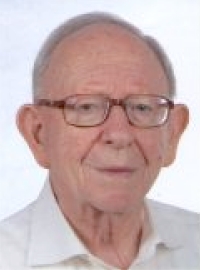Hermann Levinson
Hermann Levinson (born January 11, 1924 in Klingenthal / Sa .; † November 1, 2013 ) was a German biologist and physiologist who lived with his wife Anna Levinson in Starnberg and at the Max Planck Institute for Behavioral Physiology since 1971 and since 2004 was scientifically active at the Max Planck Institute for Ornithology in Seewiesen and Erling (Upper Bavaria).
life and work
Emigration from Germany
Hermann Levinson was born as the son of the high school teacher Leopold Levinson and his wife Charlotte on January 11, 1924 in Klingenthal in Saxony. After the National Socialists took over the government, the family had to leave their German homeland in 1935 and move to Czechoslovakia. After passing high school, Levinson fled Prague to Haifa . When he finally reached the eastern Mediterranean coast, he was received by British soldiers and transferred to a French warship. This ship was blown up off Haifa on November 25, 1940. The survivors were rescued by British marines, but referred to as "enemy aliens" and held in the Atlith internment camp until autumn 1941. Meanwhile, Hermann Levinson's parents and closest relatives were deported to the Theresienstadt concentration camp and then killed with poison gas in the Auschwitz-Birkenau extermination camp .
Education and early research
Since October 1941 at an Upper Galilean malaria research institute in Rosch Pina (Director: Gideon Mer ), Hermann Levinson carried out parasitological studies on the fever mosquito species Anopheles elutus , A. sergentii and A. superpictus as well as the malaria pathogens they host, Plasmodium falciparum , P. malariae and P. vivax . He later worked on the suppression of fever mosquito larval populations by means of biological, chemical and physical measures, such as the use of predatory fish species ( Gambusia spp.), Larvicides ( Parisian green , Pyrethrum , Rotenon and petroleum ) and draining of swamps and waters. At the University of Jerusalem he studied chemistry, microbiology and zoology, did a research paper on the resistance of some insect species to DDT and other contact insecticides and received the degree M. Sc in 1954. (Magister Scientarum). He did his doctorate under Ernst Bergmann and Gottfried Fraenkel on the subject of nutritional and metabolic physiology of the housefly Musca domestica (Cyclorrhapha) , which was awarded the degree of Dr. rer. nat. (Doctor rerum naturalium) and the rating “ summa cum laude ”. From 1959 to 1961 he worked at Cambridge University (England), with Vincent Brian Wigglesworth on the mode of action of sterols in holometabolic insect species. In 1964 he was appointed private lecturer and in 1967 professor of comparative biochemistry and physiology at the University of Jerusalem . From 1962 to 1970 Levinson taught physiology and biochemistry, headed the laboratory for insect physiology and supervised about a dozen diploma and doctoral theses at the University of Jerusalem. In 1970/71 he was visiting professor at the Zoological Institute at the University of Frankfurt am Main .
Hermann and Anna Levinson at the Max Planck Institute in Seewiesen
Since July 1971, Hermann and Anna Levinson have been researching the nutritional and sensory physiology of harmful insect and mite species as well as the mode of action of feeding and mating-stimulating kairomones and pheromones . Since 1985 they have devoted themselves to cultural-historical aspects of biology, especially the connections between zoology and ancient religions.
Services
Hermann Levinson has the indispensable requirement of the larvae of Musca domestica in Escherichia coli detected, the essential vitamins, sterols and unsaturated fatty acids of the cotton owl (Noctuidae), flour mites (Acaridae) and skin beetles (Dermestidae) is determined, as well as the conversion of phytosterols in zoosterols in Larvae of herbivorous insects discovered. He clarified the fine structure and mode of action of the pheromone glands of certain species of beetles and flies and researched the cultural-historical significance of selected arthropods in the ancient Orient. He has published over 130 scientific articles and coined the terms insectistasis and acaristasis . According to the definition, insectistasis or akaristasis (derived from the Greek stasis "standstill") result in a state in which the population density of the originally present harmful organisms is so suppressed that full harvest or long-term food storage can be achieved without significant damage.
Awards
- 1960 Sir Simon Marks Award (London)
- 1980 Korea Institute of Science Medal (Seoul)
- 1992 Sigillo d'Oro (Piacenza)
- 2006 Leading Scientists of the World (Cambridge)
- 2007 Karl Escherich Medal (Innsbruck)
Memberships
- German Society for General and Applied Entomology (DGaaE)
- Munich Entomological Society (MEG)
- Fellow, Royal Entomological Society (London)
- Lifetime Fellow, Institute of Biology (UK)
- Member, New York Academy of Sciences (USA)
Editorial activity
- Scoreboard for pest science, crop protection, environmental protection (Germany)
- Journal of Stored Products Research (England)
- Rivista di Parassitologia (Italy)
Web links
- Literature by and about Hermann Levinson in the catalog of the German National Library
Individual evidence
- ↑ Alfred Elbert: The German Society for General and Applied Entomology mourns Prof. Dr. Hermann Levinson. In: DGaaE news. Vol. 28, H. 1, May 2014, pp. 61-64.
- ↑ Pasquale Trematerra: Obituary for Prof. Dr. Hermann Levinson: January 11, 1924– November 1, 2013. In: Journal of Stored Products Research. Vol. 57, April 2014, p. 80, doi: 10.1016 / j.jspr.2014.02.002 .
| personal data | |
|---|---|
| SURNAME | Levinson, Hermann |
| BRIEF DESCRIPTION | German biologist and physiologist |
| DATE OF BIRTH | January 11, 1924 |
| PLACE OF BIRTH | Klingenthal |
| DATE OF DEATH | 1. November 2013 |
